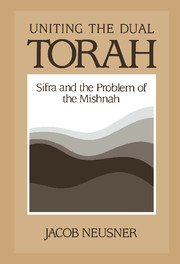Book contents
- Frontmatter
- Contents
- Preface
- Prologue
- 1 The Problem of the Mishnah
- 2 Torah as a Common Noun: The Solution of the Talmuds
- 3 A Sample of Sifra
- 4 From Common Noun to Proper Noun: Sifra's Re-presentation of the Two Torahs as One
- 5 Sifra's Alternative to the Mishnah's Topical Program and Its Order
- 6 Sifra's Alternative to the Mishnah's Logic of Cogent Discourse
- 7 Sifra's Alternative to the Mishnah's Proof of Propositions through Taxonomic Classification and Hierarchization
- 8 Re-presenting the Torah: Sifra's Rehabilitation of Taxonomic Logic
- 9 Torah as Proper Noun and the Structure of the Logic of Creation
- Appendix: The Distinctive Character of Sifra among Midrash Compilations
- Bibliography
- Index
5 - Sifra's Alternative to the Mishnah's Topical Program and Its Order
Published online by Cambridge University Press: 06 July 2010
- Frontmatter
- Contents
- Preface
- Prologue
- 1 The Problem of the Mishnah
- 2 Torah as a Common Noun: The Solution of the Talmuds
- 3 A Sample of Sifra
- 4 From Common Noun to Proper Noun: Sifra's Re-presentation of the Two Torahs as One
- 5 Sifra's Alternative to the Mishnah's Topical Program and Its Order
- 6 Sifra's Alternative to the Mishnah's Logic of Cogent Discourse
- 7 Sifra's Alternative to the Mishnah's Proof of Propositions through Taxonomic Classification and Hierarchization
- 8 Re-presenting the Torah: Sifra's Rehabilitation of Taxonomic Logic
- 9 Torah as Proper Noun and the Structure of the Logic of Creation
- Appendix: The Distinctive Character of Sifra among Midrash Compilations
- Bibliography
- Index
Summary
An authorship determines the choice and ordering of topics
The Ordering of the Mishnah's Topics
No explanation for the order of the divisions or tractates of the Mishnah can appeal to the topics treated therein, or accounts for the logic that explains why topic A has to be treated before, or after, topic B. But, then, the order of the divisions and tractates cannot be shown to be intrinsic to the plan of the framers of the document. On the other hand, when we examine the unfolding of the treatment of a given topic as represented by a tractate, we ordinarily are able to explain why a given subject comes before or after another subject, or, more commonly still, why a given problem must be solved before another, and logically secondary, problem can be addressed. It would carry us far afield to demonstrate the validity of that judgment, however.
The Topical Program of the Mishnah
The protracted account of the Mishnah's topical program shows us in great detail what it means for an authorship to define a plan of discourse on various subjects and to work out that plan within what the authorship conceives to be the problematic of the subject matter, item by item. The framers of the Mishnah know precisely what they want to find out about a given subject. That point of special interest, which, as I have explained, I call the problematic, is what they work out.
- Type
- Chapter
- Information
- Uniting the Dual TorahSifra and the Problem of the Mishnah, pp. 81 - 106Publisher: Cambridge University PressPrint publication year: 1990



